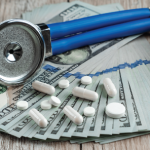NEW YORK (Reuters)—The U.S. government proposed a rule to end the industry-wide system of after-market discounts called rebates that pharmacy benefit managers receive from drugmakers, a practice that has been under scrutiny.
If finalized, the rule would change a system that has been in place for decades and that increasingly has been criticized for obfuscating the real price of prescription drugs.
The Administration of U.S. President Donald Trump has been promising to lower the cost of prescription drugs for consumers, who have seen their out-of-pocket expenses rise each year with higher list prices of pharmaceuticals.
The proposed rule from the U.S. Department of Health and Human Services would apply to companies like Cigna Corp’s Express Scripts and CVS Health Corp that manage pharmacy benefits for employers and insurers, as well as companies, such as Humana Inc., that manage Medicare prescription drug benefits, and Medicaid managed care organizations.
The government has been considering such a change since last year.
The Trump administration’s proposed rule would allow rebates on prescription drugs to be offered directly to patients, and it would allow pharmacy benefit managers to establish fixed fee service arrangements with drugmakers that could replace their revenue from rebates.

